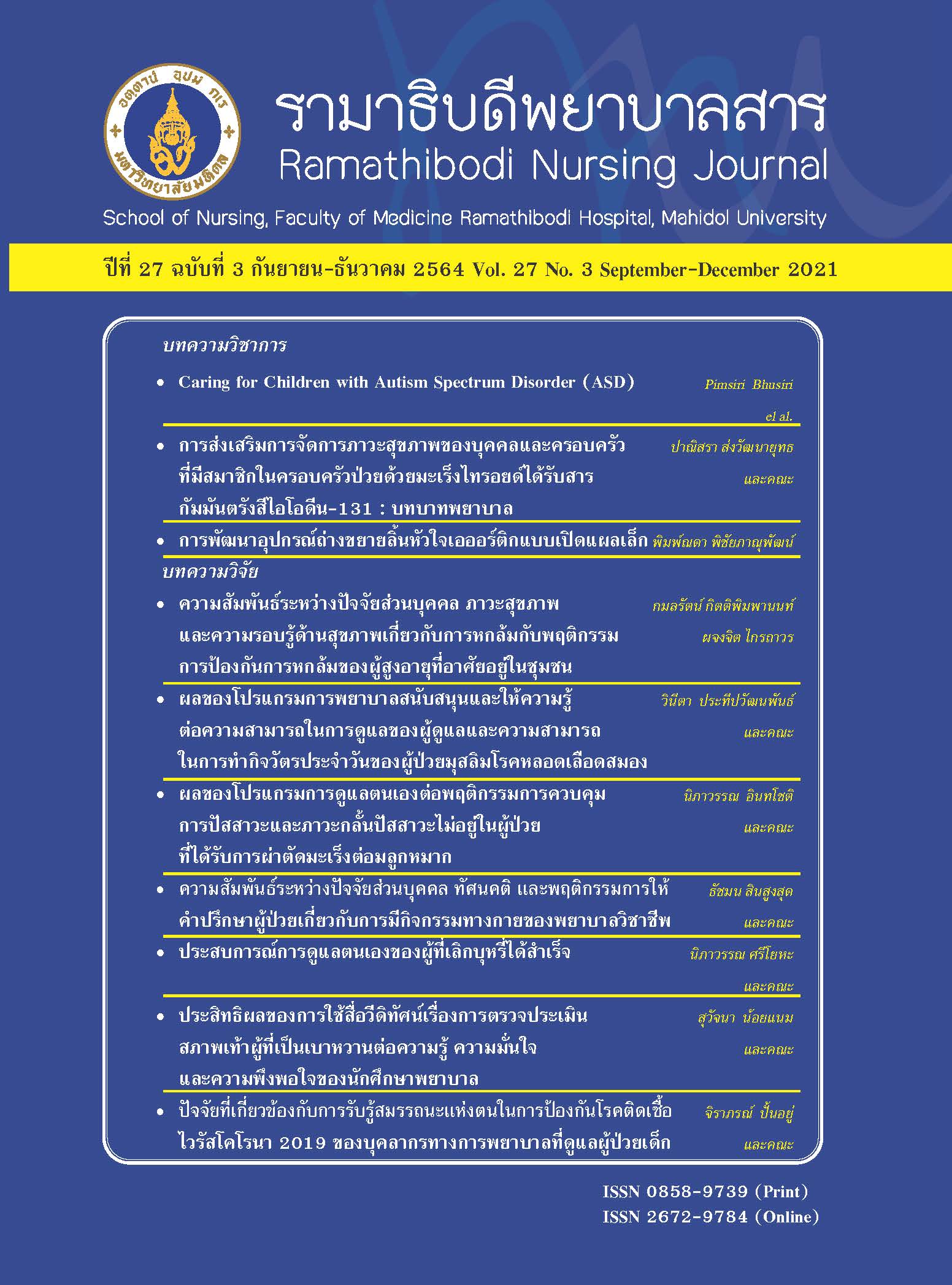Effects of an Supportive-Educative Nursing Program on Caregivers’ Caring Capabilities and Abilities to Perform Activities of Daily Living of Muslim Patients with Stroke
Main Article Content
Abstract
ABSTRACT:
This quasi-experimental study aimed to determine the effects of an Supportive-Educative Nursing Program (SENP) on caregivers’ capabilities in caring for Muslim patients with stroke, and on the patients’ abilities to perform activities of daily living (ADLs). The sample consisted of 64 pairs of caregivers and patients with newly diagnosed stroke. They were assigned into the experimental or control groups, with 32 pairs in each group using the simple random method. The experimental group received the eight-week SENP, developed
by the researchers based on Orem’s Supportive-Educative Nursing System Theory, and the control group received usual care. The data collection instruments included the demographic data and health information of caregivers and patients form, the caregiver capabilities in caring for patient assessment form, and the Barthel ADL index for patients. Data were analyzed using descriptive statistics, paired t-test, and independent t-test. Results revealed that at posttest,the mean scores of both caregiver’s capabilities in caring for Muslim patients with stroke and abilities of the patients in ADLs in the experimental group were significantly higher than at pretest. Also, at posttest, the mean score of caregivers’ capabilities in caring for the patients and abilities of the patients in the experimental group were significantly higher than those of the control group. The findings of this study indicated that the SENP could be applied to promote caregivers’ capabilities in caring for Muslim patients with stroke at home to provide care effectively, thereby enhancing patients’ abilities to perform ADLs and prevent complications of a stroke. However, this program may need to be modified for suitable use in other contexts.
Keywords: Supportive-educative nursing program, Caring capabilities, Caregivers, Abilities
to perform activities of daily living, Muslim patients with stroke
Article Details
บทความ ข้อมูล เนื้อหา รูปภาพ ฯลฯ ที่ได้รับการตีพิมพ์ในรามาธิบดีพยาบาลสาร ถือเป็นลิขสิทธิ์ของวารสาร หากบุคคลหรือหน่วยงานใดต้องการนำทั้งหมดหรือส่วนหนึ่งส่วนใดไปเผยแพร่หรือเพื่อกระทำการใด ใด จะต้องได้รับอนุญาตเป็นลายลักษณ์อักษรจากรามาธิบดีพยาบาลสารก่อนเท่านั้น
References
World Health Organization. Stroke, cerebrovascular accident; 2016. [cited 2017 November 22]. Available
from: http://www.who.int/topics/cerebrovascular_accident/en/
Punmung N, Yuledlop A, Jehpor A. World Stroke Day 2019 campaign. Bureau of Non communicable Diseases,
Ministry of Public Health; 2019. (in Thai)
Health Data Center, Satun Provincial Public Health Office.Health status; 2019 [cited 2019 October 4]. Available
from: http://hdc2.stno.moph.go.th/hdc/reports/report.php?source=pformated/format1.php&cat_id=39fd60c2
db479930db85a0e97dd3&id=7ac059f4e4e3d08750d2ee23600556af
Hickey JV. The clinical practice of neurological and neurosurgical nursing. 6th ed. University of California,
United States of America: Wolter Kluwer Health/Lippincott William & Wilkins; 2009.
Sangsuwan J. Stroke rehabilitation. Khonkaen: Klungnana Printing Press; 2011. (in Thai)
Prasat Neurological Institute. Clinical practice guideline for stroke rehabilitation. 3rd ed. Bangkok: Tana Press;
(in Thai)
Chaiwongnakkapun C, Jinawin S, Yottavee W. Impact of supportive-educative nursing system on stress and caring abilities in neuro patients’ caregivers. The Southern College Network Journal of Nursing and Public Health.2017;4(3):203-17. (in Thai)
Sakunhongsophon S, Ananthachock S, Hosakun K.Selected factor, activities of daily living and complications
in stroke survivors at home. Journal of Nursing and Education. 2011;4(2),36-52. (in Thai)
Boonvas K, Supanunt T, Chunhabordee A, Wae N.Caregiver stress and needs in caring disabled. The Southern
College Network Journal of Nursing and Public Health.2017;4(1):205-16. (in Thai)
Orem DE. Nursing concepts of practice. 6th ed. New York:McGraw- Hill Book Company; 2001.
Leumaung K. Effect of supportive-educative program on perceived caregivers’ capability for intracranial hemorrhage monitoring in patients with mild head injury. [thesis].Songkhla: Prince of Songkla University; 2013. (in Thai)
Sirintaranont P. The effect of caregivers coaching program on activities of daily living in adult stroke patients. [thesis].Bangkok: Chulalongkorn University; 2015. (in Thai)
Senasana S. Development of the home-based skill training program for caregivers of stroke patients. [thesis].
Songkhla: Prince of Songkla University; 2017. (in Thai)
Hongsoi S. Effects of program for promoting caregiver’s ability in continuing care on caregiver’s ability, functional ability, and complications in ischemic stroke patients.[thesis]. Chonburi: Burapha University; 2013. (in Thai)
Dai CH, Gyi AA. The effect of interventions directed to informal caregivers on strong patients’ activity of daily
living: a systematic review protocol. JBI Database SystRev Implement Rep. 2009;7(24):10-8.
House JS. Work stress and social support. New Jersey:Prentice Hall; 1981.
Prachon M. The effect of self-efficacy promoting program among stroke’s caregivers. [thesis]. Nakorn Ratchasima:Ratchapat Nakhon Ratchasima University; 2016. (inThai)
Moonthee W. Effect of transitional care program for stroke patients and family caregivers on patient’ s activities of daily living complications, and satisfaction. [thesis].Bangkok: Mahidol University; 2015. (in Thai)
Nimah Y, Hasuwannakit S. Medical and patient care consistent with the Muslim way. 3rded. Songkhla: Health
Systems Research Institute; 2008. (in Thai)
Kongjarern S, Wattana C, Harnirattisai T. Effects of a self-regulation program for blood pressure control on
self-regulation behaviors, blood pressure level and stroke risk among Thai Muslim with hypertension. Nursing
Journal of the Ministry of Public Health, 2013;40(1),23-33. (in Thai)
Awae R. Effect of health education with Al-Quran reading program on stress of diabetic patient. [thesis]. Songkhla:Prince of Songkla University; 2009. (in Thai)
Nimo N. Effect of self-management program in breathing exercise and al-quran listening on blood pressure in muslims with uncontrolled hypertension. [thesis]. Songkla:Prince of Songkla University; 2018. (in Thai)
Yamwong C. Effects of applications of Orem’s nursing system on patients’ and relatives’ satisfaction with care
and functional outcomes in hospitalize elderly patients.
[thesis]. Bangkok: Mahidol University; 1995. (in Thai)
Cohen J. Statistical power analysis for the behavioral
sciences. 2nd ed. New Jersey: Lawrence Erlbaum
Associates; 1988.
Mahoney FI, Barthel DW. Functional evaluation: the
Barthel index: Md State Med J. 1965;14:61-5.
Pattarapongbundit N. Effect of supportive-educative
nursing system on dependent care agency among caregivers
of stroke patients. [thesis]. Chiangmai: Chiangmai
University; 2005. (in Thai)
Dunagan WC, Littenberg B, Ewald GA, Emery EB,
Silverman DC, Roger JG. Randomized trial of nursingadministered,
telephone-based disease management
program for patient with heart failure. J Card Fail.
;11(5).358-65.
Grant JS, Elliott TR, Weave M, Bartolucci AA, Giger JN.
Telephone intervention with family caregivers of survivors
after rehabilitation. Stroke. 2002;33(8),2060- 65.


